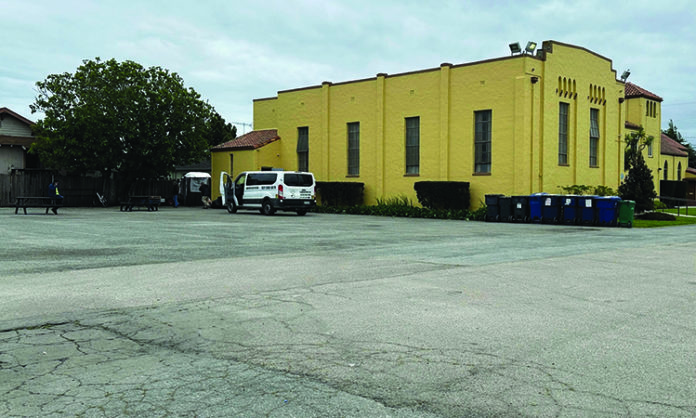
Construction will begin in June on a 34-unit community of small temporary dwellings based at Westview Presbyterian Church in Watsonville, after the Monterey County Board of Supervisors unanimously approved agreements to build and manage the facility.
The housing navigation center, which has been named “Recurso de Fuerza Village,” (which roughly translates to ‘strengthening resources’) is intended to give temporary shelter to homeless people that live along roughly three miles of the Pajaro River Levee, provide services and help them find permanent housing.
The project is funded by an $8 million Encampment Resolution Funding grant awarded to Monterey County from the State of California. It will be managed in collaboration with Monterey County, Santa Cruz County Health and Human Services and the City of Watsonville.
Among the supervisors’ approval is a $5 million agreement with San Francisco-based nonprofit DignityMoves for the development of the facility, and $2.5 million to manage the village and provide services for the first two years.
The cost for construction went up after the Federal Emergency Management Agency required that the units be raised three feet to keep them safe from potential floods.
In addition to 34 individual tiny home-style units—where residents could live for up to six months—the village will have a communal dining area and a pet area.
To help ameliorate community concerns about the village, it will also have security and cameras, 24-hour staffing, assurances that a “good neighbor policy” will help assure residents’ behavior doesn’t get out of hand.
The village was placed in Santa Cruz County at the church located at 118 First Street after trying unsuccessfully to find a spot in Monterey County, Director of Homeless Services Roxanne Wilson said.
“Unfortunately, on our side of the river there is nowhere for us to build this,” she told the supervisors.
Community Action Board of Santa Cruz County has been selected to provide supportive services to the residents.
Monterey County Supervisor Luis Alejo said that Recurso de Fuerza Village is the first collaborative project between Monterey and Santa Cruz counties and the city of Watsonville.
“Local governments in our region are partnering more than ever to better address our homelessness crisis together,” he said. “We are working hard to ensure this is a success story, and that we provide homeless residents in Watsonville and North Monterey County with a secure place to live and get the services they need.”
Supervisor Wendy Askew agreed, and said the village could become a model that might be emulated by other jurisdictions.
“It is absolutely incredible to see a project come together like this, that is spanning multiple jurisdictions, that is spanning multiple counties,” she said.
The Watsonville City Council heard an update on the project Tuesday night.
Mayor pro-tem Maria Orozco said she views it as a “pilot program” that will bring a needed service to Watsonville, which was the only jurisdiction that saw an increase in its homeless population in a survey last year.
“It is a starting point,” Orozco said. “And I’d rather start somewhere and give something a chance that has a proven record in some cases of success, versus not doing anything in the situation we’re seeing.”
But while local officials are hoping that the village will help the homeless population in Watsonville and north Monterey County—and the communities in which they make their encampments—others are skeptical.
Watsonville City council members—who heard an update on the program Tuesday night—worried that the grant only funds services for the first two years of the program, with no additional funding source identified.
Santa Cruz County Human Services Department Deputy Director Kimberly Petersen told the Watsonville City Council that the county has proposed dedicating $1 million from recently passed Measure K and a portion of Collective of Results and Evidence-based (CORE) funding. They will also seek state funding, she added.
Petersen said grants are also possible through CalAIM, a state program that provides services to people enrolled in Medi-Cal.
“When we’ve got an opportunity for funding, we’re going to start and move forward with the faith that we’re going to continue to try, continue to prioritize it and find a way to make it continue,” Petersen said.
Wilson said that people living along the levee have said they want to participate in the project. The additional money, she said, is a question for the future.
“We can’t guarantee what three years is going to look like for any nonprofit,” Wilson said. “But what we do is operate in good faith,” she said. “And right now we have the need, right now we have the money and right. Now we have people that need help. That’s the way we’re going to move.”
Still, that uncertainty troubles Watsonville City Councilman Jimmy Dutra, who said he is “completely against” the project after the council heard a report of the upcoming project Tuesday night.
“You can have empathy and also be pragmatic and use common sense for a project that’s going to be sustainable,” he said. “This project is only funded for two years, and even after last night, both Monterey County and Santa Cruz County were not guaranteeing it was going to continue beyond that.”
Dutra also worries that, if the funding runs out with nothing to replace it, the people living there would have nowhere to go, making Watsonville’s growing homelessness problem even worse.
He also says that the six-month time limit is unrealistic.
“It takes many months for the people to save money and to be appropriately placed,” he said. “I think saying, ‘we’re going to try to get you into housing after six months,’ that is lying to the community. That does not happen.”
Watsonville City Councilman Casey Clark, who works in the private mental health sector, says that without guaranteed ongoing funding—and with only six months in which to provide supportive services—the program could in fact make the problem worse if the program ends.
Clark also expressed concern that Community Action Board of Santa Cruz County (CAB), which has been selected to provide supportive services at the village, has no experience doing so.
“You guys don’t have experience in this, and this is very specialized stuff that you’re going into,” he said. “We need some standards here, or it’s just going to be a total mess, and our emergency services are already taxed, and this has the potential of adding to that.”
CAB Assistant Director Helen Ewan-Storey acknowledged that the organization has no experience running such a facility.
“But we’ve been doing our research,” she said.
Ewan-Storey added that CAB is working with both counties, the city and other partners, and has visited the sites of other programs.
CAB already has two staff running a housing placement program, and an outreach specialist, and plans to hire new staff, including case managers.












It seems to be that this is another band-aid placed over a bullet wound. At best is solution would provide six month housing for homeless individuals at worst it will be half finished before state funding is pulled due to the 70+ billion dollar deficit
The city is raising taxes on residents and landlords like myself rents have to increase to pay for city services. Has anyone noticed haw many self storage facilities have been built in SC county?
Landlords like myself find these a great alternative to building affordable housing. Easy carefree and when tenant defaults the contents get auctioned off. No rent control no evictions no hassles
The homeless crisis needs a bullet proof approach that works long term for them
How do I sign up